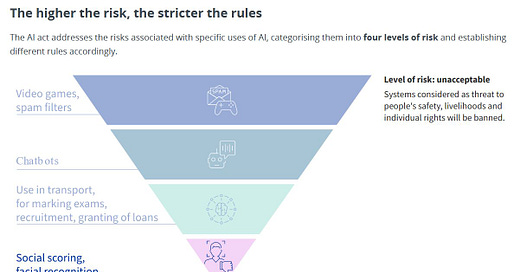🤖 AI Policy this week #004
A quick summary of news, reports and events discussing the present and future of AI and the governance framework around its development. Hopefully, every Monday morning.
1. News
The EU Agrees on Landmark Artificial Intelligence Rules.
The so-called AI Act sets a new global benchmark for countries seeking to harness the potential benefits of the technology, while trying to protect against its possible risks. Ursula von der Leyen, President of the European Commission, said: “The AI Act transposes European values to a new era. By focusing regulation on identifiable risks, today's agreement will foster responsible innovation in Europe. By guaranteeing the safety and fundamental rights of people and businesses, it will support the development, deployment and take-up of trustworthy AI in the EU. Our AI Act will make a substantial contribution to the development of global rules and principles for human-centric AI”. The AI Act follows a risk-based approach based on four categories, specific requirements for each one, fines up to 7% of global annual turnover, and dedicated rules for general purpose AI models (more info here). The political agreement is now subject to formal approval by the European Parliament and the Council and will entry into force 20 days after publication in the Official Journal.
Meta and IBM launch ‘AI Alliance’ to promote open-source AI development.
The AI Alliance is “a group of leading organizations across industry, startup, academia, research and government coming together to support open innovation and open science in AI. The AI Alliance is action oriented and decidedly international, designed to create opportunities everywhere through a diverse range of institutions that can shape the evolution of AI in ways that better reflect the needs and the complexity of our societies”, the official press release reads. The are over 50 Founding Members and Collaborators globally including AMD, Anyscale, CERN, Cerebras, Cleveland Clinic, Cornell University, Dartmouth, Dell Technologies, EPFL, ETH, Hugging Face, Imperial College London, Intel, INSAIT, Linux Foundation, MLCommons, MOC Alliance operated by Boston University and Harvard University, NASA, NSF, Oracle, Partnership on AI, Red Hat, Roadzen, ServiceNow, Sony Group, Stability AI, University of California Berkeley, University of Illinois, University of Notre Dame, The University of Tokyo, Yale University and others. The group does not include Microsoft, OpenAI or Google, setting up potential clash over regulation and responsible practice.
The Center for Democracy & Technology (CDT) submitted comments in response to the Office of Management & Budget (OMB)'s request on AI use.
According to the Center, the OMB's draft Memo shows a continued commitment to advancing equity, CivilRights & innovation. The CDT welcomed the incorporation of key elements from the White House’s AI Bill of Right, such as requiring AI impact assessments, human consideration/accountability, and notice & plain language documentation; and also the inclusion of heightened requirements for uses impacting people’s rights such as disparate impact assessments, opt-outs, & consultation with affected groups. However, it highlighted “several places it should be bolstered to increase transparency to help agencies / the public better understand federal uses of AI systems, & improve consistency/ease agencies’ burden in interpretation”.
Also some announcements:
Google launches its largest and ‘most capable’ AI model, Gemini.
The large language model Gemini will include a suite of three different sizes: Gemini Ultra, its largest, most capable category; Gemini Pro, which scales across a wide range of tasks; and Gemini Nano, which it will use for specific tasks and mobile devices. For now, the company is planning to license Gemini to customers through Google Cloud for them to use in their own applications. Starting Dec. 13, developers and enterprise customers can access Gemini Pro via the Gemini API in Google AI Studio or Google Cloud Vertex AI. Android developers will also be able to build with Gemini Nano. Gemini will also be used to power Google products like its Bard chatbot and Search Generative Experience, which tries to answer search queries with conversational-style text (SGE is not widely available yet).
Japanese tech giant Rakuten plans to launch proprietary AI model.
Hiroshi “Mickey” Mikitani said the company is working on its own large language model, or LLM. Rakuten has a number of businesses from banking to e-commerce and telecommunications, therefore has a large amount of “very unique” data to train its LLM on, according to Mikitani. “Nobody has a dataset like we do,” he added.
2. Reports and Briefs:
“AI Governance for Africa Toolkit” from Thomson Reuters Foundation.
This toolkit unpacks the context of AI Governance in Africa, the emerging governance frameworks regionally and globally. It further considers advocacy approaches for future governance.
“The geopolitics of Generative AI: international implications and the role of the European Union” from Elcano Institute.
Policy Paper providing policy recommendations to Gen AI impact on security, economy, rights and global governance, by Raquel Jorge Ricart and Pau Álvarez-Aragonés. “The European Union should play a relevant role. Evidence shows that, from the economic perspective, it lags with regards to large corporations and start-ups alike. Also, in terms of Venture Capital, it is missing the race and might fail to be on the top three worldwide. With regards to security and rights implications, the EU is moving forward, is covering generative AI under the umbrella of the AI Act with a three-level set of obligations and is contributing to discussions in international fora. Still, the EU’s bilateral technology partnerships with trusted countries and like-minded partners should deepen the conversation on generative AI”.
3. Events:
SecurityWeek’s 2023 Cyber AI & Automation Summit (Dec 6).
The event delved into the transformative potential of AI, use-cases in malware hunting and threat-intelligence, the workflow when computers take on developer tasks, government policy and regulations, intellectual property protection and privacy implications.
Relevant events are coming this week, to bear in mind:
* Global Partnership on AI (GPAI) Summit 2023: Dec 12-14, New Delhi, India.
* Unesco’s Green(er) AI and AI for Green: Untapping AI potential and mitigating risks. Dec 14.
Stay tuned! More, next Monday.





